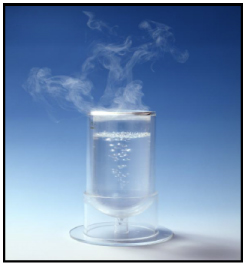I have seen the future of fuel and it is LNG. Liquefied Natural Gas. Its cool! Pun intended. To be honest I think that natural gas broadly speaking is the future, its cryogenic form is merely one manifestation. All forms of natural gas are useful; whether in pipelines, compressed, liquefied, converted to synthetic liquids or hydrogen, fossil, bio or hydrate. It all works. And that is the critical element, it works. Methane can power the big machines to get the big work done, it’s as clean as any combustible fuel can be and as safe as fire can be. Ultimately though it is the economics that are driving its widespread acceptance. Low prices thanks to the shale revolution are driving industry to spend serious money to convert big expensive machines from diesel and bunker fuel over to natural gas in its various forms.
I just returned from a small scale LNG conference where presenters from the marine, rail, trucking and high horsepower industries were discussing their experiences and opinions in converting their fleets to liquefied natural gas. Overwhelmingly the message was that economics was the primary consideration. Trucking companies for whom fuel was their number one expense were very eager to capture $1 a gallon savings across their fleets. $1 dollar may not sound like much but when you consume hundreds of gallons of fuel per truck per day, spread across many trucks 365 days a year that dollar ends up being hundreds of thousands or millions of dollars a year for big fleets. I was not surprised to hear that economics was the bottom line for these companies, in business the bottom line is the bottom line after all. But industry seems convinced that the price spread between petroleum and natural gas is going to persist into the foreseeable future and the transition will continue.
My interest in the conference though was to hear if LNG really worked. I wanted to hear from the operators themselves about their experience using LNG in the field. Because if the performance was not acceptable, if the fuel was unreliable or created maintenance problems or in any way impaired their ability to get the job done then the apparent advantage of lower costs would be trumped by their inability to complete the tasks at hand. And what I heard overwhelmingly was that LNG works great. LNG is actively being used on powerful drilling rigs, big ships and trucks and being experimented with in freight trains. These are some of the biggest most powerful machines in the world. Yes there were technical hurdles to overcome in the early days, engines needed to have compression ratios tuned, in some cases pistons needed to be hardened to handle the hotter burning fuel, and LNG takes up a lot more space than diesel so new tanks need to be accommodated. Cryogenic fuels require drivers and technicians to be trained to handle the –260 degree liquids. Boil off in the tanks require some operational considerations so that you do not leave the LNG sitting for extended days in the vehicles less some fuel be lost. LNG is not suitable for all applications where diesel is used today. LNG is best for machines that operate continuously and consume very large quantities of fuel: long distance trucking, big ships, and industrial facilities. Other equipment such as school busses may be better suited for compressed natural gas, CNG, since they operate for only a few hours at a time without going real long distances and may sit for days. CNG does not suffer from boil off, the tanks will hold the fuel indefinitely. CNG is less dense than LNG and the tanks take up more space, so the choice between CNG and LNG depends on the particular application. Regular folks driving conventional autos would use CNG for these reasons, no special training required to handle it and it is stable to be left in the home garage.
Costs aside there are other advantages to natural gas, the engines run quieter which generates fewer complaints from neighbors and reduces stress on operators. Natural gas also burns cleaner which not only improves the emissions profile but it also improves the maintenance. The beauty of clean fuels is that all those contaminants in diesel that foul the air we breathe, also foul the engines. Sulfur, heavy metals and particulates have no fuel value, all they do is create deposits in the engines and soot in the air, soot that kills many and makes all of us unhealthy. So the environmental and health advantages go hand in hand with mechanical advantages. When you combine the economic, environmental, performance, safety and domestic abundance advantages of natural gas over other energy sources it is easy to see why this transition seems so unstoppable.
